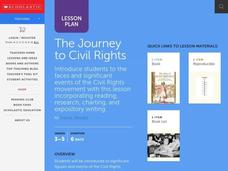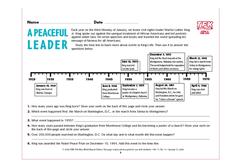Curated OER
Why Can't I Vote?
Fourth graders take an unannounced test (failure is expected) and the top scores are rewarded with candy bars. They compare this test to the literacy tests given before 1960 and votes to candybars. They journal their responses.
Anti-Defamation League
Martin Luther King, Jr. and Civil Rights
How far have we come and how far do we still need to go to achieve equality and full civil rights in the United States? Include a packet of materials collected in your observance of Martin Luther King, Jr. Day.
Curated OER
Nonviolence as a Tool for Change Lesson 1
Young scholars examine voting rights in the South during the 1950s and 1960s. In this civil rights lesson, students examine legal rights and the opportunity to cast votes. Young scholars research primary documents regarding the topic and...
Civil Rights Movement Veterans
Timeline of Events: 1960’s Civil Rights Movement of St. Augustine, Florida
A timeline can be a powerful learning tool because it reveals a pattern in events. While few would consider St. Augustine, Florida a hotbed of the 1960s Civil Rights Movement, a selection of background information and a timeline of...
Curated OER
The Journey to Civil Rights
Students explore several significant figures and events of the Civil Rights Movement and sequence the key events to create a timeline. The instructional activity utilizes the story, "The Story of Ruby Bridges," the work of Robert Coles...
Curated OER
Looking for Heroes
Pupils explain the importance of the 1965 Selma-to-Montgomery Voting Rights March and the long term impact in the US of non violent civic participation.
Humanities Texas
Primary Source Worksheet: Lyndon B. Johnson, Excerpt from “To Fulfill These Rights”
"Equal opportunity . . . is not enough." Johnson's 1965 commencement address to the students at Howard University provides an opportunity for participants to see how education was a key element in his vision for civil rights.
Curated OER
The Voting Rights Act 1965
Students examine whether their locality is covered under the voting rights act of 1965, why or why not and what local politicians think about that.
Curated OER
Unintended Consequences: Policies that Impact Migration
Students examine the cause-and-effect relationship between the Agricultural Adjustment Acts of the New Deal or the 1965 Voting Rights Act and African-American migration. They write an essay evaluating the effectiveness of the Voting...
Humanities Texas
A President's Vision: Lyndon Baines Johnson
Learners take a closer look at the presidency of Lyndon B. Johnson, including the Great Society and the passage of the Voting Rights Act, through image analysis and primary source worksheets.
Curated OER
The Journey to Civil Rights
Young scholars investigate the concepts that surround the Civil Rights Movement. They conduct research with the help of the teacher and use chart paper to create posters about major people involved. Students also complete a timeline...
Time For Kids
A Peaceful Leader
The legacy of Dr. Martin Luther King, Jr's life and message is just as important today as it was in his lifetime. Introduce elementary learners to the movement for civil rights with a timeline of Dr. King's life, as well as comprehension...
Curated OER
Laws of Civil Rights
Students investigate the Civil Rights Act of 1964. In this segregation lesson, students explore the rights that were guaranteed by the legislation as well as attempts by southerners to stop African Americans from voting. Students...
Curated OER
Constitution Day: The 1965 Alabama Literacy Test
Tenth graders examine the United States Constitution. In this American Government instructional activity, 10th graders read excerpts from President Johnson's speech to Congress and parts of the Voting Rights Act of 1965. ...
Curated OER
CIVIL DISOBEDIENCE
Young scholars use events of the time to illustrate the significance of the 1965 Selma-to-Montgomery Voting Rights March.
Curated OER
Universal Suffrage
Young scholars examine suffrage. They participate in a classroom activity in which some students get to vote and others do not get to participate. Young scholars discuss how they felt and how it wasn't fair. They write a one page essay...
Curated OER
African-American Civil Rights in the U.S.
In this African American history worksheet, students respond to 39 identification questions that require them to define or list the significance behind 39 events and people associated with the American Civil Rights Movement.
Curated OER
The Election of Barack Obama 44th President of the United States
Students consider the historic implications of Barack Obama's election. In this election of 2008 instructional activity, students research Obama's accomplishments and determine how his election signifies the success of the American Civil...
Museum of Tolerance
Making Lemonade: Responding to Oppression in Empowering Ways
An activity focused on tolerance encourages class members to consider how they might respond when they or someone else is the target of oppression and discrimination. After researching how some key figures responded to the anti-Semitism...
Curated OER
Marching For Freedom
Students appreciate the sacrifices that people from across the country made to ensure that all citizens could exercise their constitutional right to vote. They access excellent websites and documents imbedded in this plan to guide their...
Curated OER
Paul Conrad's Perspective on Civil Rights
Students review a political cartoon and discuss desegregation. In this cartoon analysis lesson, 11th graders discuss the impact of a political cartoon and its relation to a Supreme Court case. Students read additional information and...
Alabama Department of Archives and History
Alabama's 1901 Constitution: What Was at Stake?
Who should be able to vote? As part of a study of the 1901 Alabama Constitution, class members examine primary source document that reveal the reasons the authors gave to support their positions on this question and their assumptions in...
Curated OER
Change: Just a Matter of Time
Students analyze the Declaration of Independence and primary sources to explain civil rights. Then, students write a Declaration of Change to express the grievances of African Americans, and their desire to participate fully in the...
Curated OER
Fill-In : March Events in the News
What happened on March 13, 1868? What happened on March 21, 1965? Eager readers fill in the missing historical event occurring on one day in March from 1862 - 1995. There are 31 events each occurring on a different day in March. This is...

























